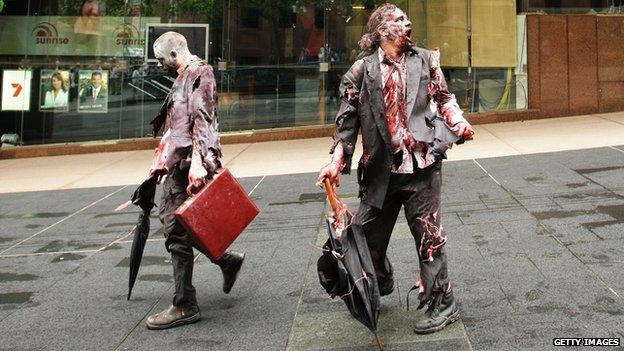'Zombie' companies eating away at economic growth
- Published

So-called 'zombie companies' make enough money to survive, but not enough to invest in new opportunities
You may have seen zombies in horror movies - the bodies of lost souls, neither alive nor dead - but experts are increasingly talking of a zombie colony in the UK economy, which is expanding and threatening to impede recovery and a return to growth.
The rise of so-called zombie companies is, to some extent, a consequence of the UK's current record low interest rates.
Struggling companies can just about afford the interest payments on their loans, but not much more. There are zombie households, too - those on interest-only mortgages, yet unable to pay off the loan itself.
"A zombie company is one which is generating just about enough cash to service its debt, so the bank is not obliged to pull the plug on the loan," explains Mark Thomas, business strategy expert at PA Consulting and author of The Zombie Economy.
"The company can limp along, it can survive, but it hasn't got enough money to invest."
According to R3, the industry group that represents insolvency practitioners, there are an estimated 146,000 zombie businesses in the UK - and, says R3, that figure is on the rise.
And according to experts around a third of these - approaching 50,000 - could be doomed to failure if interest rates go up:
"They could pull through, but urgent attention is needed to avoid the catastrophe of multiple failures and tens of thousands of job losses," says Christine Elliott, chief executive of the Institute for Turnaround, which represents financial professionals brought in to help ailing companies.
But there are concerns that banks are keeping these no-hope companies alive in order to avoid taking further, potentially significant losses - and this, in turn, could be holding them back from new lending, which is needed to boost the economy.
More failure needed
Finding a zombie company prepared to own up to its status is not easy, but I finally tracked one down in East London.
My Bottom Line: Jon Moulton
The owner, who does not want to be identified, has been a successful developer for 20 years building up a portfolio of shops and offices in the South East of England.
But he is currently stuck with more than £500,000 ($794,000) of debt, which was run up before the financial crisis. Since the credit crunch, his bank has refused to lend any more money to allow him to build houses on his main site, a former knitwear factory. And that has left him in limbo.
Speaking to Radio 4's File on 4 programme, the developer says the situation is "demoralising" and he feels trapped: "We are in a hole and we can't really get out because it's not like you can trade... without any money from the banks you can't trade."
The plunge in commercial property values has played its part in the zombie phenomenon. The British Council of Shopping Centres acknowledges that the industry is facing difficult challenges, with one in five centres already defaulting on loans, or in danger of going that way.
Property values in the sector have plunged more than a third since the top of the market - but lenders are reluctant to pull the plug because they know they will struggle to sell the assets.
The investor and entrepreneur Jon Moulton thinks the zombies pose a threat to the wider economy.
"We do need to have a situation where bad businesses fail, otherwise the economy will stack up with progressively weaker business models and growth will go into reverse," he says.
So-called forbearance - where banks give a breathing space to borrowers - has been a matter of concern for regulators, too.
They have urged banks to build up their capital reserves, so that they can more easily bear the losses when they pull the plug on zombie businesses. Critics of the banks argue they are applying forbearance to avoid making tough decisions on loans.
But Derek Sach, head of debt restructuring at RBS, denies that banks are failing to face up to their losses because they cannot afford to plug the holes in their balance sheets:
"We rigorously go through our books on a monthly basis, looking at loans where we should be making provisions - we are taking the appropriate steps to take write-downs wherever we should."
The wider concern for the economy is that money tied up in struggling companies is not available for more vibrant small businesses or entrepreneurs.
Andrew Bailey, head of banking supervision at the Financial Services Authority, says the issue is high on his list of priorities:
"It's not a bad thing to be extending credit terms to companies in this way, providing it isn't choking off new lending and new investment.
"That's why we and the Bank of England are so focussed on that question," he told File on 4.
"Zombie companies" is not a phrase that bankers and regulators like to use. Most shy away from the idea and prefer to talk in their usual jargon, like "forbearance" and "provisions".
But there is no doubt that the dead hand of the zombies is casting a shadow over the economy.
Listen to the full report on File on 4 on BBC Radio 4 on Tuesday, 13 November at 20:00 GMT and Sunday, 18 November GMT at 17:00 GMT. Listen again via the Radio 4 website or the File on 4 podcast.